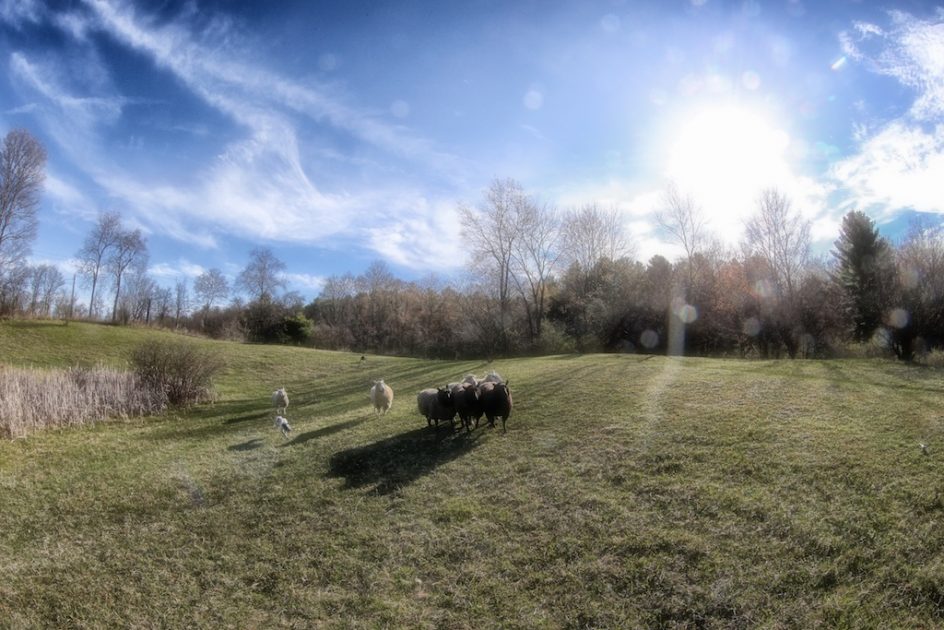
I think I know how lonely everybody is.
Always the struggle of the human soul is the break through the barriers of distance and silence and anger and fear into community, connection, and companionship. We rush towards friendship, love, art, faith, even politics pleading, fighting, clamoring for the touch of spirit laid against our struggling souls.
This, I think, is why I have ended up on a farm.
One ought, every day at least, to hear a little song, read a good poem, see a fine picture, take a sweet photo, finish an honest chore, walk with a dog, give an apple to a donkey or a horse, and if it were possible, see some beautiful things.
This what a farm makes possible for me.
I love living on a farm, more than any other place I have ever lived, and I have lived in many different places. I sometimes see the farm as Mother, sometimes as a continuing game of chess, sometimes as a laboratory for working out issues of identity, endurance, love and strength.
A farm will enchant you, challenge you, in some ways define you. And I am not even a farmer, just a writer with a farm. A farm is a fluid thing, it changes with the seasons, with the nature of the animals, with the weather. Some things are in our control so many are not. It is not an idyllic life, it is not a life for everyone.
Much of the time, it is not even a life for me.
This Spring, a new challenge, managing our pasture with a big pony, seven sheep, three donkeys.
We have about eight acres of grazing land. In a normal Spring, if there is such a thing any longer, the grass would be four or five inches high – four inches is optimal for grazing (sheep and ponies and donkeys eat low, goats eat high), between the dryness and the cool weather, the grass is just beginning to come up, we are still putting hay out, about a month later than usual.
Chloe, like most equines will graze day and night, horses kill off the grass by pulling up the roots and buds, they need to be confined in paddocks and given limited access to grass (it can make them sick in the early Spring) and usually, some hay supplement.
Before Chloe, we had enough pasture for the summer. Now, and because of climate change, it isn’t so certain.
The sheep will eat until they are hungry, and then rest. They are slugging in the summer, their wool coats leave them tired and hot. Donkeys will graze, but not as intensely as a horse or pony, they do rest, they do pause.
So how do we manage this on limited acreage? We are installing a short 200- foot fence to block off the grass on the South side of the farmhouse. That will give us three fenced in areas in which to graze the animals and allow for rotational grazing. Some farmers rotate the grass daily, we do it every two or three days.
If we are disciplined – three hours in the morning, three hours in the evening – and give the pastures a chance to recover and grow – we should last through the summer, although if it is as dry and warm as the forecasters predict, we might be on hay again as early as late July or August. We’ll wee. Climate change doesn’t only affect polar bears.
Every farmer knows in his heart that it is real, he or she can see it every day. You have to think about a farm, you can’t just live on it. You have to think about fences, grass, weather, animal health, hay and grain fresh water and worms, vets, medicines, farriers, shearers, ticks and flies and weeds and rabies and a dozen other diseases you haven’t heard of, but are common on a farm. Any of these things can affect animals.
People often tell me I am living their dream, or that I have the perfect life. But most of us know better than that, no life is perfect, and many a farmer that I know dreams of a life with more sleep, shelter, money and less brutal labor. There is no perfect life, only a live lived in purpose and self-awareness.
Joseph Campbell says that a good life is one hero journey after another, and I think I love the farm because it is one hero journey after another. You are never done, it is never finished. You are never there, things are never really settled, no two seasons are ever the same, the animals themselves change and evolve.
The Spring is the animals favorite season, and in some ways, ours. The smell is of fresh sweet grass, the flowers are bursting up in the garden, the animals are excited to eat what they are meant to eat once a gain. Winters seems the farthest away, perhaps because it is. The peepers and crickets are beginning to define the night again, a time of color and light, birth and rebirth.
One ought, every day at least, to hear a little song.
